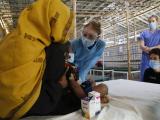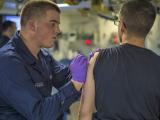Sep 17, 2012 (CIDRAP News) – The recently released annual report for the federal Project BioShield program gives a snapshot of the US arsenal for blunting bioterrorist attacks, showing growth in the supplies of certain countermeasures for anthrax, botulism, and smallpox.
The report states, among other things, that the government has decided it doesn't need the full 200,000 doses of an antitoxin for Clostridium botulinum (the botulism agent) that were ordered in 2006, instead settling for about 107,000 doses.
Project BioShield, established in 2004 and strengthened in 2006, provides authority and funds to support the development of countermeasures against chemical, biological, radiological, and nuclear threat agents.
The BioShield program is administered by the Department of Health and Human Services' Biomedical Advanced Research and Development Authority (BARDA). The new report is for calendar year 2011.
By the end of 2011, BARDA had acquired 57,102 doses of the monoclonal antibody Raxibacumab, used as an antitoxin to treat anthrax (Bacillus anthracis infection), from Human Genome Sciences. That includes 20,000 doses delivered under a fulfilled 2005 contract and 37,102 of 45,000 doses ordered under a 2009 contract option. For comparison, the total supply of Raxibacumab at the end of 2010 was 36,102 doses, according to earlier reports.
In addition, in 2011 BARDA completed the acquisition of 10,000 doses of Anthrax Immune Globulin (AIG) from Cangene, also used to treat anthrax. The supply at the end of 2010 was listed as 7,327 doses. Total spending on Raxibacumab and AIG comes to $478 million, the report shows.
BARDA previously bought a total of 28.75 million doses of the anthrax vaccine BioThrax from Emergent BioSolutions, at a cost of $691 million.
For botulism, BARDA has acquired 107,560 doses of Botulinum Antitoxin Therapeutic, made by Cangene, out of the 200,000 doses originally ordered. The supply at the end of 2010 was about 97,000 doses.
"Reevaluation of the requirement led to a decrease in the number of doses necessary in the SNS [Strategic National Stockpile]," the report says. "Thus HHS/BARDA has met the requirement."
The original contract for the product, which is derived from horse serum, was for $415 million. The report says $61 million was added to the contract to "maintain the horse herd, stockpile plasma, and continue stability testing of plasma and product in the SNS. This contract modification will ensure preparedness out to 2026."
For smallpox, by the end of 2011 BARDA had acquired 5.9 million doses of the Imvamune vaccine, made by Bavarian Nordic, up from 2.02 million doses a year earlier. The product is an attenuated vaccine intended for immunocompromised persons, who are at risk for complications from the conventional vaccinia virus vaccine.
BARDA has contracted for a total of 20 million doses of Imvamune, at a cost of $505 million. The government previously bought enough doses of the conventional vaccine to immunize the entire population.
The agency also has ordered 1.7 million treatment courses of the experimental smallpox drug ST-246, made by SIGA Technologies, under a $433 million contract. None of that amount had been delivered by the end of last year, the report says. It says the contract "works toward the USG [US government] goal of developing two smallpox antivirals."
See also:
"Project BioShield Annual Report to Congress" for 2011
BARDA's medical countermeasures page
Jul 28, 2011, CIDRAP News story covering renewal of preparedness law and 2010 annual report
Oct 6, 2011, CIDRAP News story on BARDA's 5-year plan


















